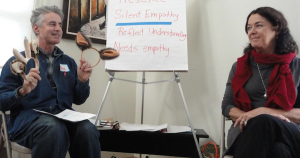Our Approach to Mediation
Our goal is to facilitate each person in the conflict being heard; in our experience when people truly feel heard and hear each other, they begin to collaborate to reach resolutions that work for all involved. We lend our skills to slow down the communication, helping clarify the intention behind the words. This helps each party in the conflict be more open to hearing the other side. By “hearing” we mean:
- Hearing in a sense of understanding – as an “aha;”
- Hearing so you can understand why a person did what they did
- Hearing while asserting your needs and well-being
- Hearing so you can experience relief from holding the conflict in your body
- Hearing so you can be free from thoughts about the conflict dominating your consciousness.
From your initial contact with us, we will help you clarify how to proceed in alignment with your values. This might include any of the following (or a combination):
- Conflict coaching sessions to help you connect with yourself and be clear in your communication with the other party (usually the option if you plan to handle the conversation on your own and want some coaching to clarify, prepare and practice)
- Our contacting the other party to invite them to a joint mediation session and help them connect with what is going on for them in the conflict
- Coaching to help you extend this invitation personally
- A joint mediation session, either in person or over the phone
- On-going coaching or training in how to communicate in ways that increase the likelihood that you will get your needs met
Conflict Coaching
Conflict coaching involves the challenge of supporting you when you’re in conflict with other(s) when there is no agreement to use a mediator. Conflict coaching and pre-mediation sessions are similar. The major difference is that when we act as a coach we are not anticipating engaging in the role of mediator with the other people in your conflict. We are supporting you to:
- Clarify your own needs related to the conflict
- Guess the needs of the other parties
- Plan what strategies you would like to use and
- Practice communication aspects of your plan.
Often, but not always, coaching will extend over several sessions organized to precede and follow a difficult conversation that you are anticipating. The pre-session is used to prepare and the post-session is used to celebrate, mourn, learn and practice. The practice referred to may consist of us role-playing you or the other party, often to prepare for the next anticipated difficult conversation. After the initial coaching session, subsequent sessions involve both reviewing what happened and what is anticipated to happen. The coaching session itself might consist primarily of a role-play.
Gail Carroll, Pat Arcady and Paul Merrill offer consulting services in addition to their scheduled class and workshop offerings.
For more information about any of their consulting services, please get in touch with Gail Carroll at: gcarroll@nvcboston.org
If you have general questions about NVC Boston activities, please send us an email at: info@nvcboston.org
We look forward to connecting with you.

